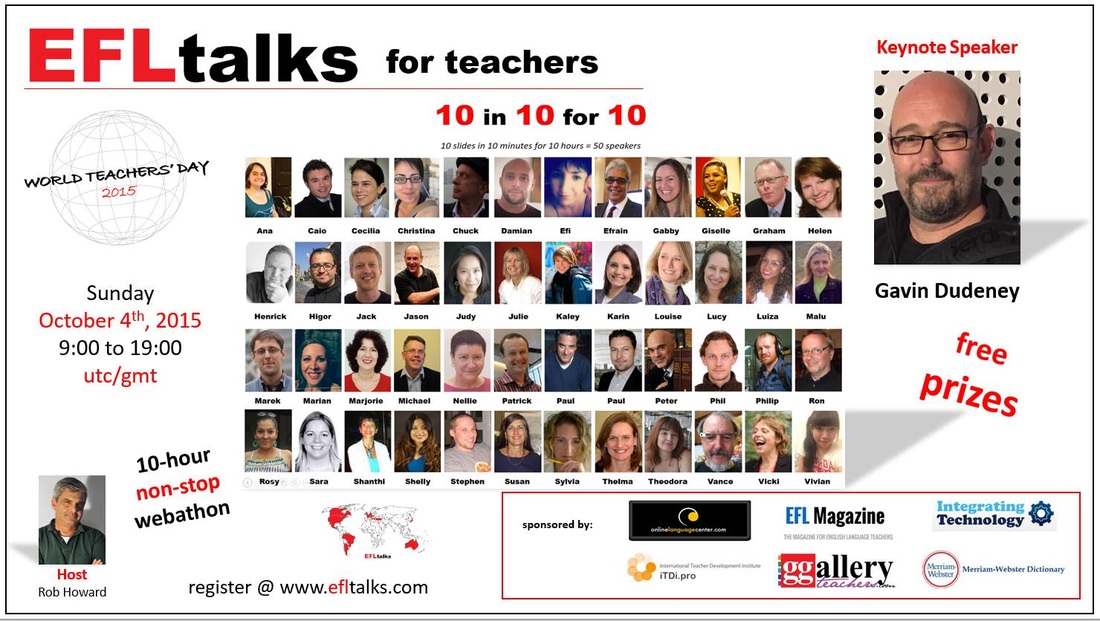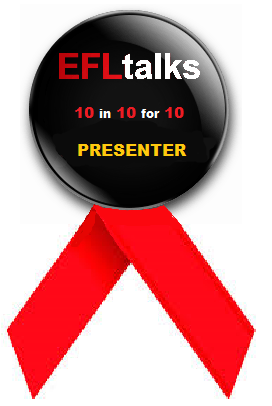|
I have always found writing about my personal experiences easier than writing about an imaginary situation which I have never been through. I therefore usually encourage students to base their writing work on something familiar to them and then adapt it to the written assignment making changes where necessary and enriching with adjectives and their imagination. As in most families, my life is divided into two eras: BC (before children) and AC (after children). In my BC days all my free time was dedicated to globetrotting and I had started writing a book about my travels. Many of those stories are outdated as times change, countries develop... I would like to start posting some of my adventures not only to encourage students to do likewise, thus practising their writing, but to stimulate people into class discussion on the topics students have written about and shared. Should anyone like to comment & let me know how things have changed since I visited these countries, it would be welcome feedback. A WEARY TRAVELLER'S TALES
Tragicomic Episodes from a Globe-Trotter's Diary As a young, well-travelled globe-trotter, I prefer visiting countries in order to get to know the people, their customs and traditions, rather than only seeing the sights from an air-conditioned bus after having left an anonymous first-class hotel. On my travels I have come across many tragicomic episodes worth recounting, which are not only amusing in themselves but offer a great insight into the ways and being of different peoples in far off countries. The best way to appreciate other mentalities and ways of life is to try and integrate oneself with the people by travelling with local forms of transport, eating in local restaurants and sleeping in hotels where one can mix with the locals rather than with tourists. Ways of the World (written in 1988): Srinigar, the capital of Kashmir in the very north of India, is famous for its houseboats, where tourists stay in fully furnished rooms often with private bathrooms, enjoying exquisite meals in chandaliered dining rooms before lounging in luxuriously carpeted living rooms. We were staying in a more modest two bedroom houseboat with private bathroom, which nevertheless had a beautifully carved table amongst its luxuries in the living room. One evening I was relaxing on my bed when I heard a strange metallic rattling and immediately attributed it to the noise the ropes make when they hit the mast in the wind. Only shortly afterwards did it occur to me that our houseboat had no mast. Then I listened and felt it must be in the room. I took my torch and looked under the armchair: there, in a cage, was a huge rat scratching at the door to get out. I called the owner immediately, who reacted by saying, "Thank goodness you found it. It's been running around the boat for days and so I thought I'd put a trap in your room just in case." It was very unpleasant to know a rat had been roaming our room and that others could be around, but to find out that the owner had let it free on the other side of the lake because he "hadn't the heart to kill it," certainly surprised us. .... next episode coming soon! Have you ever had any tragi-comic experiences? Susan
1 Comment
SONGS in the classroom: GOTTA/GONNA/WANNA/AIN’T – intermediate / advanced / teens / adults25/6/2015 Songs always bring a breath of fresh air into the classroom and are greeted with joy. I usually try to choose songs, which are not only clear and fairly easy to understand but have meaningful content for language learners such as grammar, phrasal verbs or vocabulary pertinent to what we are studying. For intermediate/advanced students I find that WHERE IS THE LOVE? – Black Eyed Peas is rather fast and has difficult vocabulary but repetitively stresses various language structures including phrasal verbs and slang abbreviations like gotta/gonna/wanna/ain’t. The song is an opportunity to discuss many controversial subjects and expressions which I have noted at the end of the song. All in all a catchy tune with profound ideas which can lead to interesting conversations. You can download the worksheets to the song below. Feel free to delete or translate the Italian into another language. Hope you have fun with it! Susan If you liked this song, check out my playlist for other chants and songs: YOU TUBE PLAYLIST: Susan's ESL Learning Videos http://www.youtube.com/playlist?list=PLrvV_PywFOlxgfR5RpMw7rLsI6ai3yHai
FREE YOUR MIND and let the LANGUAGE FLOW! – unblocking the brain for better language acquisition20/6/2015 The situation: I am in a tiny village in France for a big family reunion - relatives meeting from as far as Alaska and as close as the surrounding European countries. Most of us are at least bilingual and the mix of languages and cultures is for us as normal as it is exciting - we ourselves marvel at the wonder of it despite being used to it!! We don't see each other so often and the children grow so I approach a y oung boy handing bh out pamphlets and ask him "OK," I reply in English, "What's your name?" "I don't speak French!" he says very quickly. I continue in English, "Yes, but what's your name?" "I don't speak French!" he replies desperately. I decide to change question in English, "Where are you from?" "Seattle!" he replies. "Oh, so you must be...." - I finally got a break through - he had realised I was speaking English to him. The problem: This is the typical situation of a MIND BLOCK - he was in such panic that he couldn't understand what I was saying despite speaking to him in his native language. Many language students experience this and if in a listening exercise they don't understand the third word of a sentence they close their mind and can't understand the rest of the sentence. On the other hand if they don't understand the word towards the end of a sentence they have understood enough to make a good guess of what the unknown word could mean. Guessing the meaning of unknown words is fundamental because one can't look up every word in a dictionary in mid-conversation. But if a student experiences a MIND BLOCK he Don't think so much! Let your mind wander... My personal experience: Whilst teaching myself Spanish with audio-cassettes many years ago, despite repeatedly listening to a sentence with great concentration that I found impossible to understand, I could in no way decipher it. I was driving while listening and decided to carry on listening to the tape ignoring that particular sentence. I played that cassette continuously for about three weeks and very often my mind wandered to things I needed to do but obviously my sub-conscience was paying attention because all of a sudden a little light went on in my brain and I stopped the cassette - I had suddenly understood that sentence! I went back and forth on the tape - it was true! I really understood it! I had given my brain repetition, time to 'digest' and elaborate and it had been free to absorb the language so that suddenly I understood. So DON'T FIX YOUR MIND ON WHAT YOU DON'T UNDERSTAND! CONCENTRATE on what you DO UNDERSTAND, then RELAX, OPEN YOUR MIND to any new sounds GUESS and leave your brain our time to do the rest!! Give your brain a chance! It really works! Susan Update: Try out my LISTENING COMPREHENSION with Susan’s A WEARY TRAVELLER'S TALES on my YouTube Channel:
I often find exercises in course books asking students to correct the mistakes they find. I personally skip these as I think students should constantly be given examples of good language to embed in their brains and not mistakes printed in course books. Peers correcting each other’s work is different as they know that there could be mistakes but it is not officially printed in a course book. Likewise my favourite revision game, the GRAMMAR AUCTION, offers sentences written on the board that may or may not contain mistakes, but it is in an unofficial format again. Words written in a course book are ‘official’ and students may accidentally embed the wrong structures in their minds – at least that is the way I see it.
Likewise I disagree with those exercises requesting students to translate back and forth from their own language. Even though I know that recently using the students’ own language in class has been re-evaluated, I personally feel that I should speak only English in class as their opportunity for full-immersion is very limited and my class time is one of those. I therefore avoid translating and as far as possible give (and request from them) definitions rather than translations of various vocabulary items. Not only does it give them the opportunity to practise there describing skills but it should help the word stick better in their minds than a quick translation. Apart from that, translating words causes the brain to continuously make an effort to pass from L1 mode to L2 mode and vice versa. The brain should switch into one language mode when one is learning and remain in that mode as far as possible. I have no scientific research to back my theory up – only my own long experience in language learning myself – but I am convinced of what I say. Now many bilinguals (like myself) out there will now assert that they are constantly mixing languages automatically picking out the word which best conveys a meaning thus contradicting my above statement. However, this mechanism occurs when the languages being mixed are firmly embedded in one’s mind – a very different situation from that of a language learner, especially at lower levels. I therefore welcome exercises which match definitions rather than translating them, pictures which are associated with vocabulary and course books which are solely written in English (except maybe for the grammar explanations). I always tell my students to SWITCH INTO ENGLISH MODE and speak to me in English as far as possible. What are your views on this subject? Hope to have given you some food for thought! Susan DO / DOES: INTENSE 3rd PERSON PRACTICE in the Simple Present – a fun game in an engaging context19/6/2015 Despite exam time and last minute end of year activities there are those who are already planning ahead for the new school year and others thinking of summer camp activities to do with their English language students. Even many of my better students have not all grasped using the 's' in the 3rd person singular despite knowing the rule - as always, it has to be practised so that it becomes natural. The following game does just that:
It’s the TV SURVEY PART 1: Setting up the game 1. Tell the students to copy the table you will draw on the board onto a piece of paper turned horizontally. (See template to download.) 2. In the first column write the CATEGORY of a TV programme: e.g. CARTOONS 3. In the second column write the NAME of a TV programme: e.g. Tom & Jerry (they can write their own favourite programme here). 4. Ask a student: Do you like .....CARTOONS....? 5. Boy: Yes, I do. / No, I don't. (depending on his preference) 6. Teacher asks another student whilst indicating the first student: Does he like .....CARTOONS....? 7. Student: Yes, he does. / No, he doesn't. (depending on his preference) 8. Now write the next CATEGORY of a TV programme: e.g. DOCUMENTARIES 9. In the second column write the NAME of a TV programme: e.g. NATIONAL GEOGRAPHIC (they can write their own favourite programme here). 10. Ask a student: Do you like .....DOCUMENTARIES....? 11. Girl: Yes, I do. / No, I don't. (depending on her preference) 12. Teacher asks another student whilst indicating the first student: Does she like .....CARTOONS....? 13. Student: Yes, she does. / No, she doesn't. (depending on her preference) 14. This phase of completing the table with all the categories and questions should not be drawn out too long - it's the setting up phase for the actual game. PART 2: INTERVIEWING A FRIEND - Pairwork 1. Each student should interview the classmate next to him & mark, in a third column called FRIEND, a tick or cross depending on the friend's preferences by asking: a. Do you like .....CARTOONS....? b. Classmate: Yes, I do. / No, I don't. (depending on his preference) PART 3: THE ACTUAL GAME - here comes the fun part! 1. The class is divided into teams A & B. 2. One team member has 30 seconds to speak about his partner by looking at the ticks & crosses in front of him. 3. He says: She likes... / She doesn't like... as quickly as possible & gains one point for each correctly pronounced sentence. a. The teacher silently counts the points as the student speaks, making sure not to count any such as 'He like...' or 'He don't likes...', which inevitably slip in. 4. The teams take turns until the end of the lesson when the winning team is announced. 5. The aim of this final activity is to give the students intensive practise in pronouncing the third person at speed so as to fix it in their minds, loosen the muscles in their mouths and help it to become second nature. Hope you have fun with it! Susan Which is the best way to learn a language? By LISTENING! A baby is born and listens to the language (or languages) spoken to him for approximately two years before it can form simple complete sentences. It does not study grammar but picks it up in context with the vocabulary and speaks it more or less correctly from the beginning. My personal experience is exactly the same: I learn languages best by being exposed to them in various formats but most of all by listening. One does not need to study grammar in detail because even when we speak our own native language we don’t think of all the grammar rules whilst we’re speaking. Therefore the easiest and most natural way to pick up a language is primarily by listening to it a lot it. When you say something you’ll gradually recognise if it sounds wrong. One of the BEST TECHNIQUES is to listen to a very short sentence or part of it, stop the recording, repeat it with exactly the same speed and intonation (without the distraction of reading it) and only progress to the next sentence when you sound fluent in the previous one. The muscles in your mouth gradually loosen, you feel less tongue-tied and all of a sudden you’re repeating the sentences fluently. Doing this exercise even only five minutes a day will boost your fluency incredibly! It’s summer holiday time – more time for everything including 5 minutes a day fluency practice. Reading, singing and watching TV with English subtitles are great additions to your fluency training. Here are some of the websites I absolutely recommend for LISTENING PRACTICE with the technique I have just explained above. Voscreen – only 5 SECONDS ENGLISH game to understand and repeat http://www.voscreen.com/ ororo.tv – complete TV series in English http://ororo.tv/en LyricsTraining - an easy and fun way to learn and improve your foreign languages skills, through the music videos and the lyrics of your favorite songs. LyricsTraining also has a special Karaoke mode that lets you sing and enjoy the full lyrics. http://lyricstraining.com soundsenglish.com – graded listening with exercises http://www.soundsenglish.com TED TALKS - for more advanced and extended listening practice, a full collection of lectures and talks arranged by topic. ted.com and lots and lots of YOU TUBE – watch your favourite YOU TUBERS !!!! Do you you know of any others? Hope you have fun and feel the improvement with it! Susan Update: Try out my LISTENING COMPREHENSION with Susan’s A WEARY TRAVELLER'S TALES on my YouTube Channel:
A native or non-native language teacher? Until recently there was, to me, absolutely no doubt about it - native. Then I started noticing various blogs writing about it in favour of non-native speakers and also a movement in favour of equal opportunities - this got me thinking and discussing the subject with my students.
I cannot hide that I've always taken advantage of my native bilingual status and promote my children's native English-Italian-speaking status as a result, too. As native English speakers in a foreign country we therefore have an advantage. I was recently contacted by a non-native English teacher who wanted to polish up her skills with me and when she introduced herself she immediately told me that her greatest problem was being non-native. When she applied for a job in Italy as an English teacher with a non-native name and surname she was automatically put to the test and needed all kinds of qualifications. On the other hand if a youngster from Britain with a name like Mary Smith were to apply to a private language school whilst on a gap year, she would easily be taken on for a couple of months without necessarily having any teaching qualifications or experience – just based on the fact that she is a native speaker of English. As teachers we all know that being native does not make one automatically a good teacher - I speak from personal experience. In Great Britain, at least when I was at school, we never studied English grammar and what we learnt was rather basic. I first learnt proper grammar when I started studying French and German. Before that I was totally unaware of anything more than verbs, nouns, adjectives and adverbs. When I was 17 I started substituting my mother teaching Italian at evening classes due to an illness: she just said, “Follow the book!” That's what I did and because the grammar was so well explained I had no trouble teaching from the book. When I was 18 or 19 somebody asked my mother if I could give them English lessons but apart from a little conversation I had never done so before. This was the first time I was confronted with the dilemma of why some questions started with a verb whilst others started with do/does. Not having a textbook to follow, but just my total inexperience, resulted in a couple of disastrous lessons before the summer holidays brought our lessons to an end. Despite being a native speaker I was totally incompetent! Thirty-eight years later I am a totally confident, well-prepared teacher always on the lookout for new ways of engaging my students. I have since met many excellent non-native teachers and follow the blogs of some amazing non-natives! I have, however, met a great number of non-native teachers who are officially qualified to teach English but in reality do not have the necessary skills. They know and teach the grammar correctly, mark the work without any problems yet when they speak spontaneously they make the most basic grammar or pronunciation mistakes having just reprimanded a student on the same point - unacceptable! Moreover many schools abroad use literature textbooks written by non-native language teachers and despite having been proofread by a native speaker, the language is so contorted that it absolutely reflects the language of the authors, as no native would approach the subject in that way. Whenever a book doesn't sound natural I check the author and realise it is inevitably a non-native so even when the books are written really well, they will betray themselves in their style. Having said that I have often been a non-native teacher myself - responding to requests to teach languages I am competent in. Despite my attempts to divert my students to native teachers, they have various reasons for wanting me to teach them and I am only consoled by the fact that their exam results are satisfactory. In my opinion the bottom line here is not so much whether native or non-native, qualified or unqualified but rather whether the teacher is PASSIONATE and COMPETENT. I have met many qualified teachers whose English made my hair stand on end and others lesser qualified but extremely competent and passionate who managed to engage their students and get the best out of them. What’s YOUR OPINION? Other opinions on this issue: https://eltreflections.wordpress.com/2015/05/01/discriminating/ www.teflequityadvocates.com Hope to have given you some food for thought! Susan Introducing the PRESENT PERFECT in an easy, fun, memorable way and then adding a more complex activity to recognize the structures in contrast to the SIMPLE PAST is always very successful in my classes ranging from teens to adults. The class is divided equally into teams A and B. The FIRST GAME is a question of LUCK: it consists in exploiting my favourite hobby, which is travelling, but it can be extended to other fields equally well. I have travelled extensively during my life and so the teams have to take turns in asking me these two questions, which I write on the board (before even introducing the grammatical explanation): Students; Have you ever been to …………. ? (only countries) Teacher: Yes, I have. (win points*) / No, I haven’t. (NO points* - other team’s turn) Students; When did you go there? Teacher: I went there in ……….. . (I write the date and the team member has to read the year correctly to win 1 point) Rules: (* 1 point – Europe / 2 points – outside Europe / 3 points – improbable tourist destination) If a team repeats a question – NO points (it encourages listening to the other team). As you can see, it’s a question of luck whether they win a point or not because they can’t know where I have been. If you haven’t travelled extensively you could use only cities or only activities or only food etc.. So the game can be adapted to your experience: e.g. Have you ever done bungee jumping? = 3 points / Have you ever played golf? = 2 points / Have you ever played tennis? = 1 point. The repetitive nature of this activity fixes the structure in their minds before they ever need to know the grammar behind it. In my classes I have difficulty stopping the activity after 30 minutes because they are so excited to discover where I’ve been… The SECOND GAME is a question of CONCENTRATION and SPEED: it consists in each student having a column of sentences (see download) to consult. The teacher has previously printed and cut out a series of sentences which students will alternately (team A then team B) pick out of a bag and read aloud to all the class. The first person in the whole class to find a logical consequence to the sentence from their list to consult wins a point for their team. In this case the whole class participates in looking for the answer. The teacher has both questions and answers to check but sometimes more than one answer may be possible. This exciting game gets them thinking and although it’s slow at starting, once they have read them a few times it really picks up speed and makes them use their brains rather than the usual ‘easy, automatic’ answers one is often requested to do in books. Hope you have fun with it! Susan
A note regarding the downloads:
To my frustration I can’t seem to find the original documents in my computer so I have had to scan the copies I use at school. Should I manage to find them I will substitute them with the better originals. qui per effettuare modifiche. Noughts & Crosses as another of my favourite end of lesson REVISION GAMES had already been planned for this post when I realised that tekhnologic had just been awarded the BRITISH COUNCIL TEACHING ENGLISH Featured blog of the month for April 2015 for a very similar game dedicated to students who are at a much higher level. A great idea I had never thought of and will certainly implement!
I tend to use this game for elementary to pre-intermediate levels to REVISE FORMULATING QUESTIONS (which is forever tricky) and IRREGULAR VERBS. I divide the class into two teams. As can be seen in the photo, I put verbs in the base form and they have to formulate sentences using the verbs in the simple past and spelling them to me correctly to be allowed to place a nought or cross in their square. Alternatively I put irregular verbs in their past form and ask them to formulate questions for the other team with them. For elementary students I put verbs in the present tense and also suggest a pronoun in order to have some questions asked or sentences formulated in the third person. Noughts & Crosses is a very versatile no-preparation revision game, which is particularly fun and useful towards the end of the year when students are getting tired and teachers want to verify how much they have retained. It can be a warmer, a filler or even a complete lesson I discovered. That is the power of Noughts & Crosses! Can anyone suggest any other simple REVISION ACTIVITIES? Hope you have fun with it! Susan |
Categories
All
Would you like regular English learning & teaching ideas? Subscribe to my blog so you don't miss a post!
AuthorMy name is Susan Brodar, born in London into a multilingual family and brought up bilingual English / Italian. Archives
December 2018
|
||||||||||||||||||||||||||||||||||||||||||||||||||




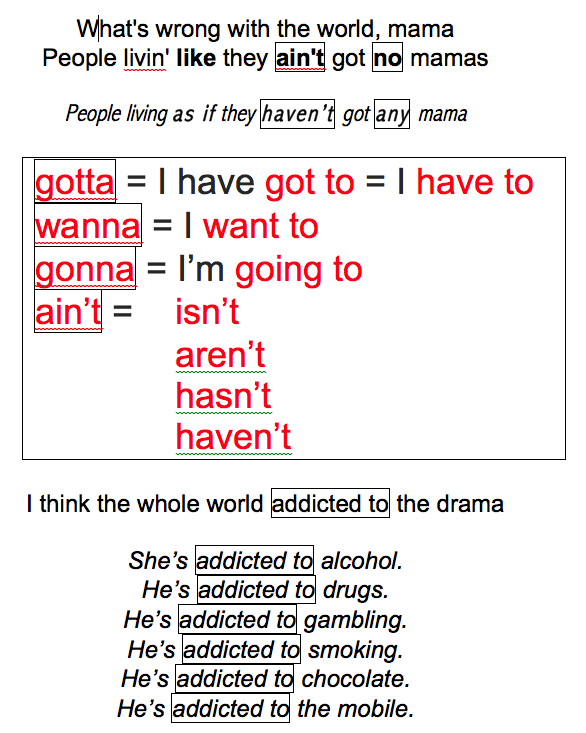



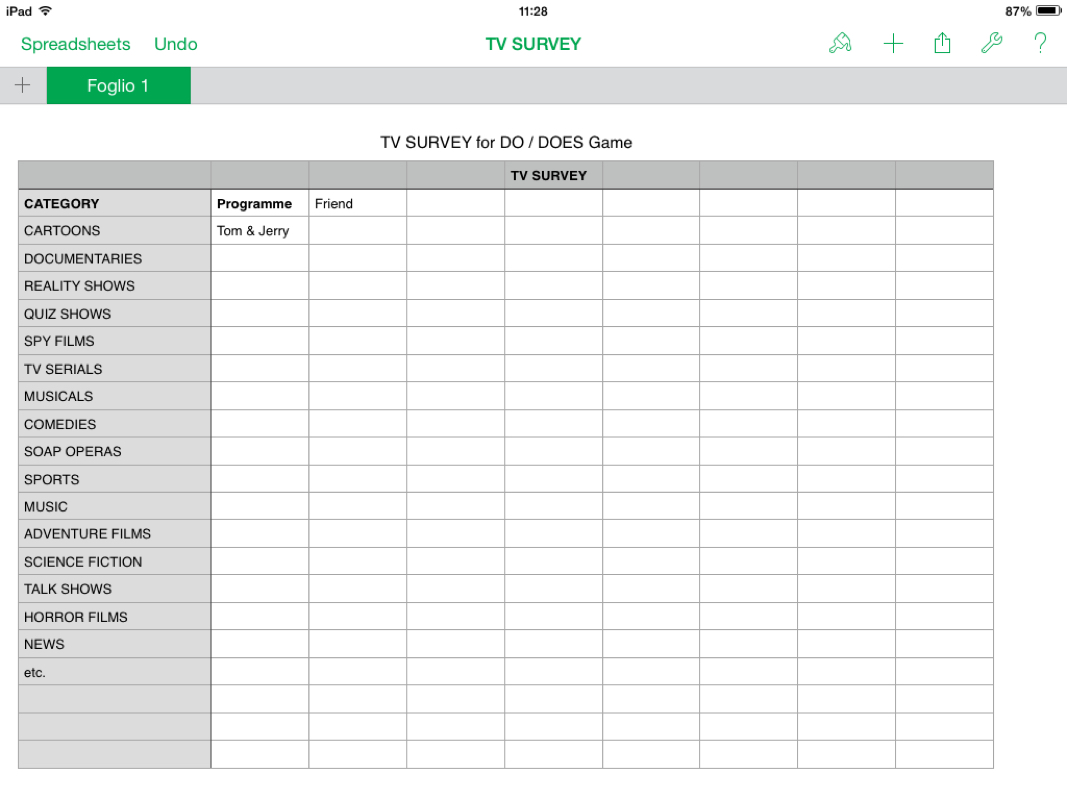


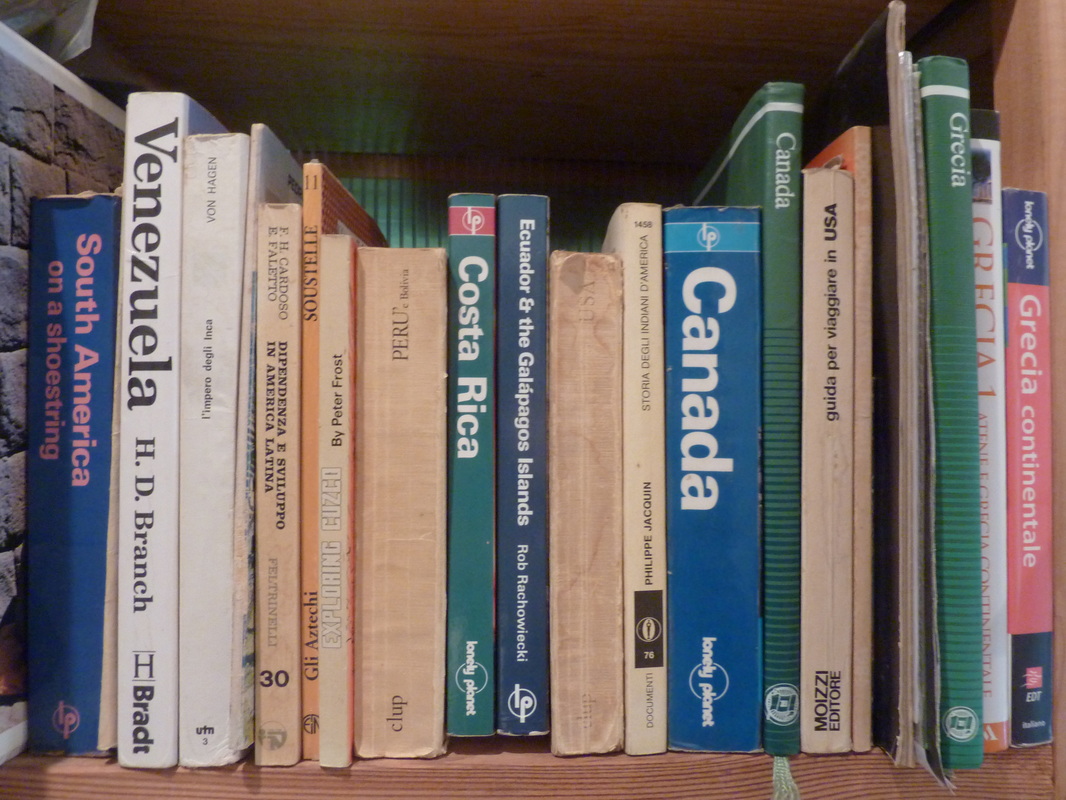
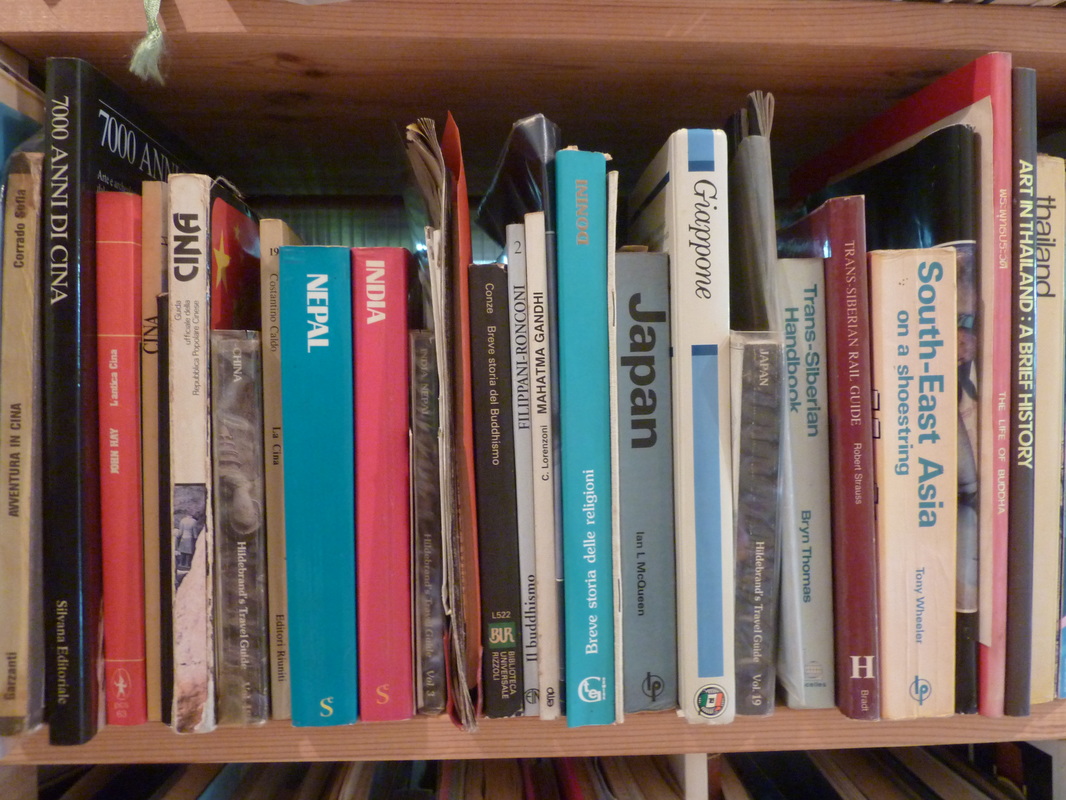
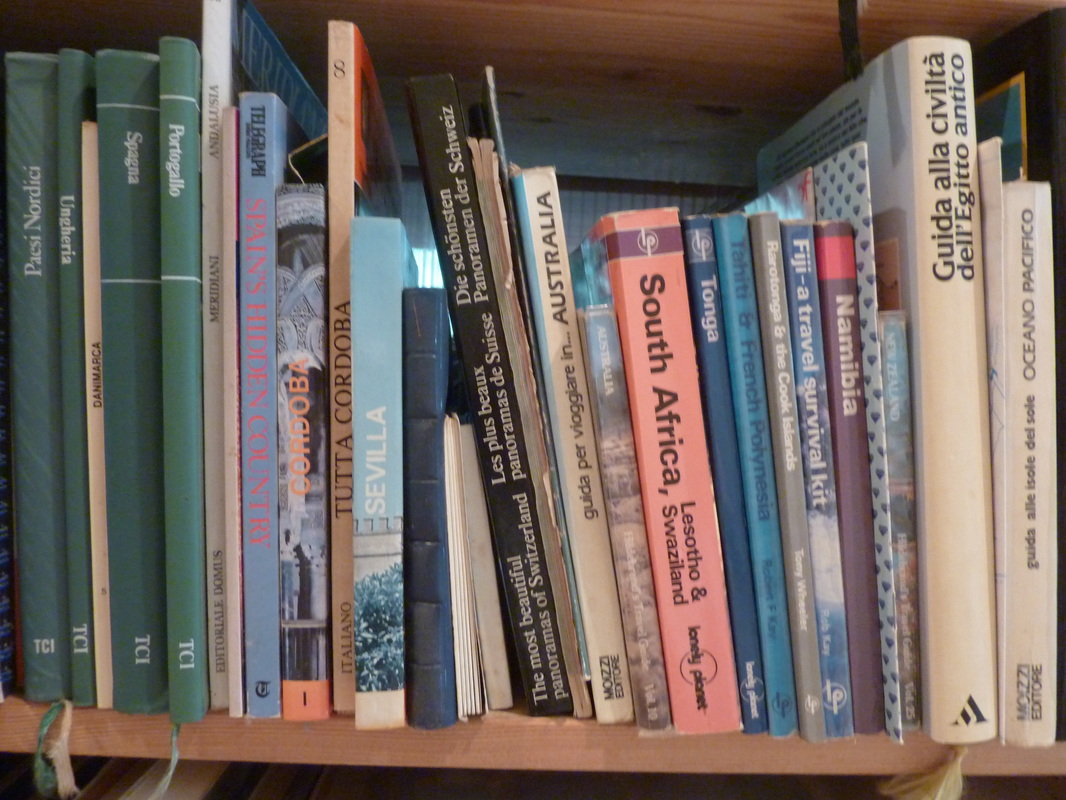
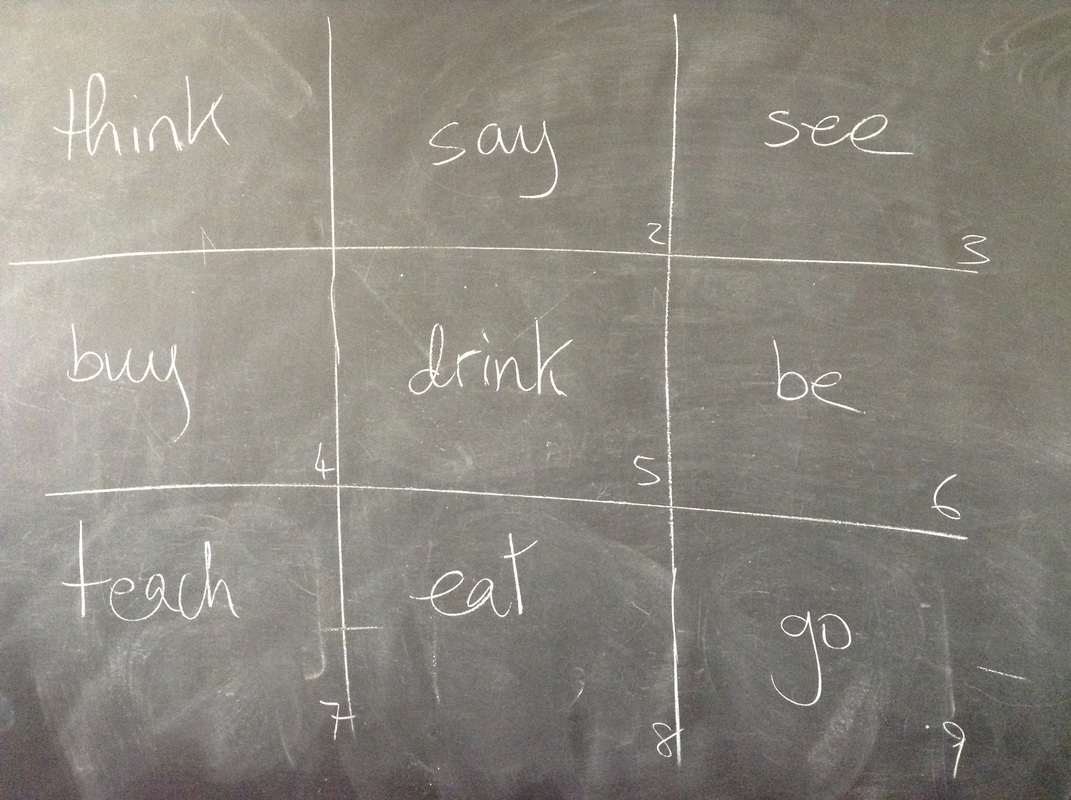




 RSS Feed
RSS Feed
